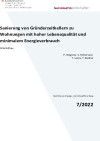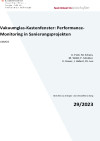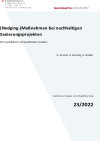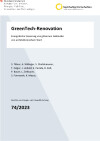Suchergebnisse für "Factsheet: Energietechnologien gestalten, die für alle sinnvoll und nutzbar sind"
Quartier im Bestand - Umsetzungskonzept zur Energieoptimierung in Bestandsquartier Nofels in Feldkirch
Das Projekt zielt darauf ab, den Energieeinsatz im Quartier durch Einsparung, Nachverdichtung, Umrüstung sowie Energiespeicherung zu optimieren. Zudem sollen klimaangepasste Freiräume die Lebensqualität und Resilienz steigern. Die Ergebnisse sollen auf das Stadtgebiet hochskaliert werden und einen wesentlichen Beitrag zur Klimaneutralität leisten.
CEPA-Connect
Die CEPA-Energiefassade ist ein innovatives System zur Gebäudesanierung mit einer außenliegenden aktiven Energieebene. Der Sanierungsmarkt soll hiermit revolutioniert werden. Bei der Entwicklung des Systems stehen Fragen einer ganzheitlichen Lösung für die thermisch-energetische Sanierung von Gebäuden im Fokus.
Sanierung von Gründerzeitkellern zu Wohnungen mit hoher Lebensqualität und minimalem Energieverbrauch (SPACE4free)

Planung von dauerhaften und schadensfreien Wohnungen mit hoher Lebensqualität und minimalem Energieverbrauch in Souterrainbereichen feuchtebelasteter Keller von Gründerzeithäusern. Durch den Einsatz von innovativen Lüftungssteuerungen wird ein behagliches Raumklima erzeugt. Gleichzeitig wird die Toleranz gegenüber unterschiedlichen Nutzungsarten gewährleistet. Ein Planungstool ermöglicht die Skalierung der Erkenntnisse und somit die Anwendbarkeit auf verschiedenste Planungssituationen.
Schriftenreihe
7/2022
P. Wegerer, S. Hinterseer, T. Lewis, T. Bednar
Herausgeber: BMK
Deutsch, 163 Seiten
Downloads zur Publikation
ECO-Transformation - Energietransformation durch Community-Building, Suffizienz und serielle Lösungen am Beispiel des "Cottage Viertels"
Vernetzung technischer und umweltpsychologischer Expertisen zur Entwicklung eines Transformationsprozesses hin zum klimaneutralen Quartier auf Basis der Methoden Community Building, Suffizienzpotenziale sowie seriell anwendbare Umsetzungslösungen anhand des Beispiels Cottage Viertel. Vorbereitung der seriellen Umsetzung der entwickelten Lösungen und des Transformationsprozesses.
LehB:KlimafitDemo2+1 - Leben heute im Bestand: Klimafitte Bestandssanierungen im Rahmen der Wohnungsgemeinnützigkeit
Das Projekt LehB:KlimafitDemo2+1 untersucht innovative Sanierungslösungen zur klimafitten Modernisierung von gemeinnützigen Wohnbauten, ohne die Mieter:innen finanziell zu belasten. Durch die Implementierung eines flexiblen Baukastensystems und die Einbindung der Bewohnerschaft werden wirtschaftliche, technische und soziale Aspekte der Sanierung optimiert. Ziel ist es, durch angepasste Maßnahmen und umfassendes Monitoring einen wichtigen Beitrag zur Erreichung der Klimaneutralität bis 2040 zu leisten.
ProzesSan - Prozessinnovationen zur Erhöhung der Dekarbonisierungs- & Sanierungsrate im Wohnbau
Das Projekt soll die Gebäudeeigentümer:innen großer Immobilienbestände bei den Herausforderungen in Bezug auf die Sanierung ihrer Gebäudebestände unterstützen. Zu Beginn werden die verschiedenen Hemmnisse identifiziert und dafür entsprechende Lösungsmöglichkeiten erarbeitet. Diese werden in drei Workshop-Stufen mit den Eigentümer:innen erprobt und daraus ein Workshop-Handbuch samt Leitfaden entwickelt.
Favorite Facades ReUse
Das Sondierungsprojekt "Favorite Facade ReUse" hat sich zum Ziel gesetzt, die Sanierung und thermische Ertüchtigung von Gebäuden mit vorgehängten Fassaden mit maximalem Re-use-Anteil und größtmöglicher Schonung der Bewohner:innen zu verwirklichen. Die Authentizität des Gebäudes bleibt erhalten, der CO2-Ausstoß wird minimiert.
ReCon: Entwicklung eines resilienten Klett-Verbindungs-Systems zur anpassungsfähigen Montage von Bauteilkomponenten im Hochbau
Systemische Auseinandersetzung mit der Klettverbindung und Bauteilschnittstellen zur Entwicklung eines resilienten Verbindungssystems zwischen Bauteil/-Komponenten unterschiedlicher Funktion und Lebensdauer. Das angestrebte Ergebnis dient der Verifikation des Verbindungssystems und bildet eine Grundlage für weiterführende Erforschung und Etablierung im Hochbau.
Circular Standards: Erstellung eines kreislauffähigen Standard-Detail-Katalogs
Im Rahmen des Forschungsprojektes wird die bautechnische Konstruktion von Standarddetails bestimmt. Details werden recherchiert, analysiert und bewertet und hinsichtlich des Parameters "Kreislauffähigkeit" (weiter-) entwickelt oder umgearbeitet. Das erwartete Ergebnis besteht in kreislauffähigen Standarddetails sowie der Identifizierung von Problemstellen und Potentialen.
GreenTech-Renovation - Energetische Sanierung von gläsernen Gebäuden von architektonischem Wert
Der Schwerpunkt des Projekts GreenTech-Renovation war, innovative Lösungen zur energetischen Sanierung von architektonisch wertvollen Bauten mit hohen Glasanteil zu finden. Dafür wurde ein zukunftsweisendes bauphysikalisches Konzept entwickelt, das den Einsatz alternativer Energieformen beinhaltet. Ein intelligentes Nutzungskonzept kann mit ökologischem und sozialem Engagement die energetischen Sanierungskonzepte verstärken und deren Nachhaltigkeit garantieren. Die 10-R der Kreislaufwirtschaft (Refuse, Rethink, Reduce, Reuse, Repair, Refurbish, Remanufacture, Repurpose, Recycle, Recover) dienen dabei als Leitlinie.
EnerPHit-Grünkonzept - Modernisierung eines Gründerzeitgebäudes mit Anwendung eines Aerogel-Dämmputzes
In diesem Demonstrationsvorhaben wurde eine umfassende Modernisierung im gründerzeitlichen Gebäudebestand beispielgebend für die Randbedingungen einer regionalen Schutzzone umgesetzt. Durch die Anwendung des Aerogel- Hochleistungsdämmputzes wurde eine gründerzeitliche Fassadendämmung im Rahmen einer hocheffizienten, umfassenden Sanierung bei gleichzeitiger Erhaltung des Fassadenbildes umgesetzt.
ReBuildStock – Portfolio-Management zur Dekarbonisierung großer Wohnungsbestände
Portfolio-Managementmethode zur Unterstützung der Entscheidungsprozesse von Eigentümer:innen größerer Wohnungsbestände bei der Erarbeitung von Strategien zur schnellen und sozialverträglichen Dekarbonisierung ihrer Gebäudebestände.
Vakuumglas-Kastenfenster: Performance-Monitoring in Sanierungsprojekten (VAMOS)

Fortsetzung und Vertiefung der Sondierung VIG_SYS_RENO zum Einsatz von Vakuumglas in Kastenfenstern für Zwecke der energetischen Optimierung von solchen Konstruktionen für Sanierungszwecke / Bestandsertüchtigung; Als Ergebnis werden vertiefte Kenntnisse über den Einsatz von hochwärmedämmenden Vakuumgläsern via Simulation und Einbau/Monitoring in Realsituation erarbeitet.
Schriftenreihe
29/2023
U. Pont, M. Schuss, M. Wölzl, P. Schober, K. Hauer, J. Haberl, Ch. Lux
Herausgeber: BMK
Deutsch, 147 Seiten
Downloads zur Publikation
Zukunftshof - Zukunftshof Rothneusiedl - Crystallization point of a climate model district
Transdisciplinary expert networking to develop a structural, thermal, and energy-efficient renovation concept, as well as a master plan with innovative energy, monitoring, green space, and agricultural utilization concepts. The result serves as a source of ideas for contemporary revitalization and forms the basis for the implementation of the demonstration project.
Lüftungskonzept Österreich
Ziel des Projektes ist die Schaffung eines Nachweisverfahrens (auf Basis Microsoft-Excel), welches zeigt, ob eine natürliche Lüftung bzw. Fensterlüftung bei einer Standardnutzung zur Vermeidung von Schimmelbildung ausreichend, bzw. in Hinblick auf eine ausreichende hygienische Luftqualität zumutbar ist.
SPIDER - Subtraction as a measure to Preserve and Insulate historic Developments by Electric Robots
In dieser Sondierung soll das Potential von autonomen, daten-getriebenen Robotern erschlossen werden, die in einem andauernden kontinuierlichen Prozess thermische Performanceverbesserungen durch Schaffung von dämmenden Lufteinschlüssen erzielen.
OttoWagner-ArealPlus - Machbarkeitsanalyse zertifizierte Plus-Energie-Quartier-Sanierung des denkmalgeschützten Otto-Wagner-Areals
Entwicklung eines innovativen denkmalschutzverträglichen Sanierungskonzepts zur Transformation des Wiener Otto Wagner-Areals in ein Plus-Energie-Quartier. Das Jugendstil-Juwel umfasst eine Fläche von rund 50 Hektar, 70 Gebäude und eine Brutto-Grundfläche von rund 200.000 m². Der Lösungsansatz umfasst dabei höchste Energieeffizienz- und Komfortanforderungen.
Decarb Alt Erlaa - Transformation des Wohnparks Alt Erlaa zu einem klimaneutralen Quartier
Sondierung einer Transformation des Wohnparks Alt Erlaa zu einem klimaneutralen Quartier anhand systematischer Potenzialanalysen in Bezug auf bautechnische Maßnahmen, gebäudetechnische Maßnahmen und einer sozialwissenschaftlichen Begleitung des Transformationsprozesses. Das Ergebnis der Sondierung dient als Ausgangspunkt zur Umsetzung der Maßnahmen in einem Folgeprojekt.
(Nudging-)Maßnahmen bei nachhaltigen Sanierungsprojekten

Auf der Grundlage einer soziologischen Kontextanalyse von ausgewählten Projekten der Programme „Haus der Zukunft“ und „Stadt der Zukunft“ und einer quantitativen Online-Erhebung unter NutzerInnen von Wohnobjekten werden unter verhaltensökonomischen Gesichtspunkten die relevantesten, durch Umbau- bzw. Sanierungsmaßnahmen verursachten Störfaktoren zusammengefasst und (Nudging-)Maßnahmen antizipiert.
Schriftenreihe
23/2022
K. Grosch, H. Kuschej, A. Walter
Herausgeber: BMK
Deutsch, 76 Seiten
Downloads zur Publikation
GreenTech-Renovation - Energetische Sanierung von gläsernen Gebäuden von architektonischem Wert

Der Schwerpunkt des Projekts GreenTech-Renovation war, innovative Lösungen zur energetischen Sanierung von architektonisch wertvollen Bauten mit hohen Glasanteil zu finden. Dafür wurde ein zukunftsweisendes bauphysikalisches Konzept entwickelt, das den Einsatz alternativer Energieformen beinhaltet. Ein intelligentes Nutzungskonzept kann mit ökologischem und sozialem Engagement die energetischen Sanierungskonzepte verstärken und deren Nachhaltigkeit garantieren. Die 10-R der Kreislaufwirtschaft (Refuse, Rethink, Reduce, Reuse, Repair, Refurbish, Remanufacture, Repurpose, Recycle, Recover) dienen dabei als Leitlinie.
Schriftenreihe
74/2023
S. Tillner, A. Willinger, S. Stockhammer, T. Zelger, J. Leibold, E. Paráda, D. Bell, P. Bauer, L. Zeilbauer, S. Formanek, K. Mauss, B. Lipp, T. Dobra
Herausgeber: BMK
Deutsch, 152 Seiten
